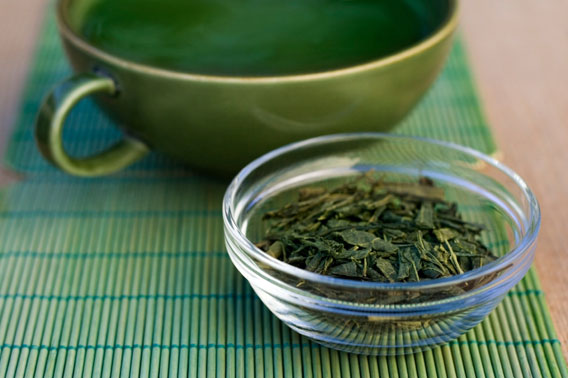A Cup of Tea—and an Exercise Bike
New research shows that catechins, the nutrients in green tea, combined with exercise help trim fat bellies
By Taylor McNeil
Could a cup or two of green tea every day help you become slimmer and more healthy? Apparently so, based on a new study that found that people who exercised moderately and consumed nutrients called catechins, found in green tea, were more likely to lose abdominal fat while exercising than those who didn’t take them.

Green tea might do more than warm you up; it seems to help people who exercise lose abdominal fat. Photo: iStockphoto
The study, published in the Journal of Nutrition, divided 107 healthy but normally sedentary and overweight adults into two groups: those who received beverages with the green tea catechins and those without them. They were monitored for 12 weeks to make sure each study participant maintained a similar exercise regime, and their body fat was measured at the beginning and end of the study.
Those who consumed the catechins had “a trend toward greater loss of body weight … compared with the control group,” the researchers wrote. Even though the levels of total body fat for the two groups wasn’t greatly different at the end of the study, it turned out that the catechin-drinkers showed significant losses of abdominal and subcutaneous abdominal fat and in serum triglycerides, a type of fat in the blood that has, in high levels, been linked to heart disease and stroke.
The daily dose of catechins in the study was 625 mg. An average cup of green tea has between 150 and 250 mg, depending on its strength, a byproduct of its brew time.
“Catechins are widely distributed in plant foods,” says Jeffrey Blumberg, a research team member and senior scientist in the Antioxidant Research Laboratory at the Jean Mayer USDA Human Nutrition Research Center on Aging at Tufts. “However, the richest dietary source by far is tea—white, green, oolong and black,” though green tea has the highest concentrations.
Catechins are the main nutrients in green tea, and other research has found that they seem to have anti-obesity effects in animals and humans, which led to the Tufts study. Because of their positive findings, the researchers suggest further study, especially to determine the mechanism responsible for the catechins’ fat-reducing effects.
The researchers received funding from the Kao Corporation in Japan, which markets sports drinks with catechins in Japan. No studies have been done to compare the efficacy of those drinks with green tea, though. Many of those kinds of products, Blumberg notes, contain other nutrients besides catechins, so a direct comparison would be difficult.
Taylor McNeil can be reached at taylor.mcneil@tufts.edu.

